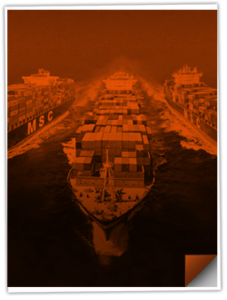Featured Headlines:
TSCA Issues Chemical Substance Import Certification Process Revisions
Siluriformes Fish (Including Catfish) Now Under FSIS Inspection
FDA Pushes for Mandatory ACE Elements, NCBFAA Pushes Back
One Destination Control Statement for EAR and ITAR Items
CBP Establishes New Procedures to Investigate Trade Related Allegations of Evasion of AD/CVD
Hanjin Services Freeze Worldwide as Carrier Goes Under
TSCA Issues Chemical Substance Import Certification Process Revisions
In 1976, Congress enacted the Toxic Substances Control Act (TSCA) in order to, among other things, protect human health and the environment against unreasonable risks resulting from the manufacture, distribution in commerce, processing, use, or disposal of chemical substances or mixtures. The U.S. Environmental Protection Agency (EPA) is the agency primarily responsible for implementation of TSCA.
Amendments to the existing customs regulations are proposed on the definition of “chemical substances” to include language that makes clear that the regulation applies to the importation of chemicals regardless of whether they are “chemical substances” subject to TSCA.
These amendments would replace the existing definition of the term “chemical substances in bulk form” and add new definitions for the terms “TSCA chemical substances as part of a mixture” and non-TSCA chemical.
Import certification would require the submission of additional information relating to the certifying individual, including name, phone number and email address for TSCA certifications submitted electronically. U.S. Customs is proposing to eliminate the blanket certification process.
Comments will be accepted on or before September 28, 2016 to the proposed regulatory changes to 19CFR Parts 12 and 127.
Siluriformes Fish (Including Catfish) Now Under FSIS Inspection
Just when you think you have it all straight what FDA regulates and what USDA regulates, a change is made by the government.
The Food Safety Inspection Service (FSIS) of the United States Department of Agriculture (USDA) is now inspecting Siluriformes and Siluriformes-containing products if used as a food fish. To see if your fish is subject to import FSIS inspection, please go to the Integrated Taxonomic Information System (ITIS) for a full list of Siluriformes Fish.
The chart below shows many of the common names for fish that are imported for FSIS inspection.
For additional information, please refer to the USDA/FSIS website.
FDA Pushes for Mandatory ACE Elements, NCBFAA Pushes Back
The National Customs Brokers & Forwarders Association of America (NCBFAA) pushed back against Food and Drug Administration’s (FDA) July 1 proposed rule to codify ACE required elements. The trade group cited several data elements that have been considered optional for the past 20 years, revised as mandatory under the new ruling creating additional barriers to entry for import filers. At the moment, an optional data element can be marked as ‘unknown,’ allowing an entry to be filed with Customs & Border Protection (CBP) for release while FDA reviews the shipment. Additionally, the NCBFAA seeks revisions to several of FDA’s proposed definitions and the way value data is submitted.
NCBFAA voiced concerns that certain data elements usually considered optional, such as active pharmaceutical ingredient (API) and intended use, to be mandatorily filed at the time of entry. In the current process, CBP can process and release an entry while FDA is still reviewing the shipment, allowing cargo to be moved to the importer’s premises. Under the proposed ruling, a shipment would be held at the port until FDA issues a “may proceed” notice. The new requirement could result in cargo backlogs at ports, increased storage and demurrage costs that are associated with stagnant cargo for space and equipment.
FDA’s proposed definitions have also been subject to scrutiny. For example, the definition for “owner or consignee” as the entity “eligibly to make entry” is vague, and could result in several parties, including a broker, to fit the requirements and be listed on the filing. Additionally, while the NCBFAA welcomed a revision to allow for the total value of an entire entry to be filed, versus the present requirement to file the value of each line item, it errs by not permitting the total value to exceed the invoice value reported to CBP. This requirement is impossible in cases where the commercial invoice includes non-dutiable charges such as freight costs.
Comments on the proposed rule were due by August 30, however, and extension could be issued while other vested parties, such as the American Association of Exporters and Importers, to provide sufficient feedback from the community.
One Destination Control Statement for EAR and ITAR Items
The final “bookend” rules from Commerce and State were published in the Federal Register on August 17, 2016 with a new harmonized Destination Control Statement (DCS) effective November 15, 2016.
The newly harmonized DCS for Commerce and State reads:
“These items are controlled by the U.S. Government and authorized for export only to the country of ultimate destination for use by the ultimate consignee or end-user(s) herein identified. They may not be resold, transferred, or otherwise disposed of, to any other country or to any person other than the authorized ultimate consignee or end-user(s), either in their original form or after being incorporated into other items, without first obtaining approval from the U.S. government or as otherwise authorized by U.S. law and regulations.”
Both final rules are part of the President’s Export Control Reform (ECR) Initiative. As part of the ECR efforts, the agencies have sought to harmonize regulatory provisions that are intended to achieve the same purpose. The DCS is an example of this effort and it should reduce the burden on exporters.
This final rule removes the requirement to place the Destination Control State on the bill of lading, air waybill, or other shipping documents and retains the requirement for the commercial invoice.
Effective November 15, 2016 Exporters:
- Must include the DCS on the commercial invoice.
- Must include the DCS on the commercial invoice under the Export Administration Regulations (EAR) for all shipments of tangible items on the Commerce Control List (CCL), including exports authorized under No License Required (NLR).
- Must include in addition to the DCS on the commercial invoice, the Export Control Classification Number (ECCN) of each item on the commercial invoice for shipments of 9×515 or “600 series” items exported in tangible form.
- Do not need the DCS for shipments designated as EAR99 tangible items or shipments under License Exceptions BAG or GFT.
- Do not need the DCS on the air waybill, the bill of lading, or other export control documents.
- Must also specify the country of ultimate destination, the end-user, and the license or other approval or license exemption citation, along with the DCS on the commercial invoice for shipments of defense articles in tangible form under the ITAR.
- Must also provide the end-user and consignees with the appropriate ECCN or EAR99 classification of the items included in the shipment when exporting items subject to the EAR pursuant to a Department of State license or other approval.
Note: Licenses issued prior to November 15, 2016, will still show the requirement to put the DCS on the Bill of Lading/Air Waybill or other shipping documents but the requirement for Commerce and State after 11/15/16 is to include the DCS on the commercial invoice only. The DCS should not appear on the transport documents.
Regulation citations affecting these rules: § 758.6 of the Export Administration Regulations (EAR) & § 123.9(b)(1) of the International Traffic in Arms Regulations (ITAR)
The final rules can be accessed here:
BIS expects to issue FAQ’s on their website at a later date pertaining to the DCS.
CBP Establishes New Procedures to Investigate Trade Related Allegations of Evasion of AD/CVD
On August 22, 2016, U.S. Customs and Border Protection (CBP) published an Interim Final Rule (IFR) in the Federal Register providing guidance for filing allegations of evasion of Antidumping and Countervailing Duty (AD/CVD) orders under the Trade Facilitation and Trade Enforcement Act of 2015 commonly referred to as EAPA. The IFR provides for a 60-day comment period to allow individuals to submit feedback, views or arguments on all aspects of the interim rule.
If you import goods subject to antidumping (AD) or countervailing duty (CVD) orders, be ready for possible increased investigations. On August 15, 2016, the Government Accountability Office (GAO) released a CBP report finding that an estimated $2.3 billion in AD and CVD duties went uncollected between 2001 and 2014. With the new EAPA provisions to report allegations and the results of the GAO investigation, importers must be keenly aware of the products they import as it pertains to AD/CVD.
Currently, any EAPA-related allegations as described in the IFR may be submitted to CBP via the following email address: [email protected].
CBP is also developing a web-based portal through which individuals can submit EAPA-related allegations, hopefully by the end of the calendar year.
For questions, comments, or the submission of attachments regarding EAPA allegations, please email CBP at: [email protected]. Please state in the subject line of your email that you are submitting an EAPA allegation.
Hanjin Services Freeze Worldwide as Carrier Goes Under
The world’s seventh-largest container line, Hanjin Shipping, sent shockwaves throughout the industry as it filed for and was placed under court protection on August 31, 2016. After a liquidity plan fell short and was rejected by the Korea Development Bank, Hanjin applied for receivership, which, once granted, will allow the company to ‘wind down’ under the direction of its main creditor.
Response from both the financial and shipping industries has been swift and sharp. Since the news broke, terminals and service operators around the world have refused to service Hanjin vessels or release cargo until payment has been received, creating a “hostage-like” scenario for shippers and importers trying to receive goods from a steamship line that is entering bankruptcy and liquidation.
For the U.S. market, Hanjin has the option to file for Chapter 15 bankruptcy which allows a foreign company access to the U.S. court system during insolvency. This protection would force ports, terminals, truckers, and other service providers to file their claims in Korean proceedings and forbid them from holding Hanjin property or cargo. Until a Chapter 15 filing occurs, conditions on the ground will likely continue to be more fluid and volatile as service providers scramble to gain access to cargoes.
Shapiro will be updating the following list of affected services as they are received:
- Port of Prince Rupert, DP World, CN– All Hanjin containers currently in its system will be released for pickup from its origin terminals, with no storage charges for these boxes. CN will not accept additional Hanjin export loads, or bookings from other shipping lines destined for Hanjin vessels.
- Georgia Ports Authority– The GPA blocked Hanjin vessels from calling at the Garden City container complex. No official statement has been released.
- Port of Virginia– Effective immediately, the Port of Virginia will not be accepting any inbound Hanjin cargo (freight for export) at any of the port’s marine or intermodal terminals. The port, however, will accept empty Hanjin containers at the PPCY. Further, the port is developing plans for how to handle Hanjin cargo that is already on-terminal. Those plans will be communicated to all port customers, users and stakeholders as soon as they have been finalized.
- Global Container Terminals– The terminals at the Port of Vancouver, B.C. will no longer receive Hanjin ships. No official statement has been released.
- Maher Terminals– Hanjin import deliveries must be pre-paid and exports will no longer be accepted. Empty container will also no longer be accepted in the off-dock depot. No official statement has been released.
Hanjin is currently a member of the CKYH-E alliance (Cosco, K-Line, Yang Ming, and Evergreen) as well as several other vessel sharing agreements (VSA). Alliance members have announced that they will no longer move or book cargo on Hanjin vessels. For shipments that have not yet sailed, it is likely there will be delays in lining up alternate routings.
Hanjin Shipping has also announced that they will no longer accept any new bookings, causing shippers reliant on their service to flood the market. This substantial reduction in trans-Pacific capacity serves to strengthen the hefty GRI announced by carriers, set to take effect on September 1. With cargo volumes strong, this added strain on capacity will likely create challenges as BCOs and NVOCCs adjust routings and bookings.
As of September 7, a list of “safe haven ports” where Hanjin Shipping’s container vessels can discharge without risk of arrest by creditors seeking outstanding payments has been announced and are listed below:
- Singapore
- Hamburg
- Los Angeles
- Busan
- Gwangyang



